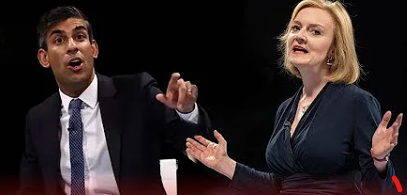"How anyone can still argue that grammar schools are the magic wand to improve our broken education system beggars belief."

Both candidates in the race to No 10 have pledged their support for the expansion of selective education.
Rishi Sunak’s pledge was made during the Tory leadership hustings in Leeds this week. During the debate the former chancellor was asked if he would support the move to bring back grammar schools and he said “yes.”
“I believe in educational excellence, I believe education is the most powerful way we can transform people’s lives. But I also think there’s lots we can do with the school system as we have it.
“Now what Michael Gove did several years ago was transformative. And Michael took on some vested interests, challenged consensus, brought in some reforms that mean that millions of our children now are better off.
“But that’s a Conservative way to do it. It’s not about throwing more money at the problem, it’s about reforming the system to get better outcomes. And that’s what I would do with education as well,” Sunak added.
Following the debate, Rishi Sunak’s team clarified that he supported opening satellites to existing grammar schools.
Sunak’s rival Liz Truss was not asked the same question in the debate, but she reportedly told the right-wing 1922 committee of Conservative MPs at a husting that she would end the ban on new grammar schools.
The foreign secretary told Conservative Home website that she is a “huge supporter of grammar schools”.
“My two daughters now attend a grammar school, and I want people around the country to have the choice that we have to be able to send our daughters to a grammar school.”
Middle-class privilege
In 1965, amid concerns that the selective school system created middle-class privilege and heightened class division, a Labour government started to phase out grammar schools. In 1998, Tony Blair’s government put an outright ban on new grammar schools being opened in the UK and banned new schools from selecting pupils by their grades under the School Standards and Framework Act.
However, existing grammar schools are still allowed to expand and accommodate more students. There are currently 164 grammar schools in the UK.
In 2016, the then prime minister Theresa May revealed plans to scrap the ban and create a new generation of grammar schools, as well as expanding on existing ones. May argued that grammar schools improve social mobility and, in reintroducing them to Britain, would make the country a “true meritocracy.”
May’s plans met opposition, with Labour saying bringing new grammar schools back to the education system would “entrench inequality.” The then shadow education secretary Angela Rayner labelled the policy “divisive” and that it would “segregate” children.
Like when May announced her intention to bring back grammar schools, the Tory leadership hopefuls’ promises to see their return has been met with opposition.
In response to Sunak’s comments at the Leeds’ hustings, political commentator Patrick O’Flynn tweeted: “Not saying Rishi is in a blind panic as his campaign completely disintegrates, but don’t be surprised if he is offering everyone a free owl by the weekend.”
Another critic of Sunak’s pledge labelled it “reactionary and regressive.”
Reacting to the candidates’ support of an expansion of selective education, Dr Nuala Burgess, chair of Comprehensive Future, which campaigns for a secondary school system with fair admission and to put an end to 11-plus exams, said:
“It seems extraordinary that with a teacher retention crisis and schools desperate for funds, that the only education policy that the Tory leadership candidates can come up with is a push for more grammar schools.
“We firmly believe that outside a tiny minority of mainly elderly, comfortably-off Conservative members who will vote for our next PM, there is no appetite for the increased stress, bitter competition for school places and hot-housing of little children that more 11-plus testing and more grammar schools will inevitably generate.
“Every single piece of available evidence demonstrates conclusively that working class children do worse in areas of the country that have retained grammar schools. How anyone can still argue that grammar schools are the magic wand to improve our broken education system beggars belief. More grammar schools means more secondary moderns – you cannot have one without the other, but this is a point avoided by those who insist on the benefits of a selective education system. They also avoid mentioning that it permits schools to reject 80% of the pupils who apply for a place.”
Comprehensive Future also noted how Sunak would expand grammar schools by using the Selective School Expansion Fund (SSEF). The SSEF funds academy schools and local authority-maintained schools which select by ability to expand, subject to conditions.
“Sunak’s bid to make the expansion of grammar schools more palatable by re-introducing Theresa May’s flawed Selective School Expansion fund suggests he has not done his homework. He and his party should be ashamed of the fund’s failure to meet promises that it would bring many more disadvantaged pupils into grammar schools. The fact is that the £50 million spent in the Fund’s first year led to just 77 additional pupil premium places.
“If our former chancellor really cared about education, he would use his education budget more wisely. He might start by applying his financial acumen to finding ways of restoring teachers’ salaries to 2010 levels and increasing per pupil spending. In this way, every child and young person would benefit, irrespective of the school they attended,” Dr Nuala Burgess continued.
Celia Birchby, former headteacher of a primary school in Macclesfield, told LFF her thoughts on the reintroduction of grammar schools in the UK.
“As a child attending a grammar school in the 1960s, I remember how horrendous the system was, splitting up friends from primary school and stoking division. It’s all about the same-old Tory elitism. But what they don’t understand is that most of us don’t want elitism, we want everyone to be equal.”
Gabrielle Pickard-Whitehead is a contributing editor to Left Foot Forward
Related Posts:








